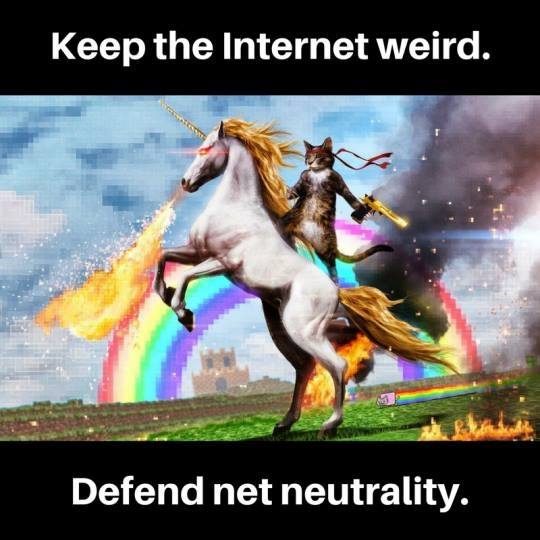During last week’s day of action for net neutrality, I called, petitioned, and emailed my representatives. Then I switched my profile picture to a ninja cat on a unicorn with lasers for eyes.
The picture above is terribly cliched. But that could be a good thing, in context. It could even be meaningful.
No corporate interests drove the cultural triumph of pixelated rainbows or feline ronin. But these memes are rooted in our psyches to an almost oppressive degree nonetheless. That we can look at the above image and think “well, duh, that’s the internet for you, gee whillikers” and yawn to ourselves or roll our eyes says something powerful.
That something is the glorious and surprising online hegemony of participatory culture.
Participatory culture is Professor Henry Jenkins’ term of art for grassroots communities that grow, share, and create via technology. Jenkins views participatory culture as primarily something that young people do; for the purposes of this blog, it is age-unrestricted.
The web may be the ur-example of modern participatory culture. The internet is strange because strange people banded together and worked hard to make it strange. Not all of these weirdos have corporate money to throw around. Not all of them have access to avenues for organizing or communicating offline. But they know how to use the internet. And they are worth protecting.
Internet-mediated participatory culture impacts a tremendous and growing swath of modernity. In recent years, the power of the internet to unify and concentrate cultural movements has borne sometimes delightful, sometimes alarming fruit in the form of participatory politics. Participatory politics is also Henry Jenkins’ coinage, and it’s just what it sounds like: using technology on a grassroots level to connect with likeminded individuals and effect political change.
You encountered participatory politics during the 2016 presidential election. You have been living with the fallout ever since.
Participatory politics is like any other tool or process: how it is used depends on the intent of those who use it. Participatory politics has fueled, among other things, Black Lives Matter, Occupy Wall Street, the MP expense account scandal, Gamergate and the alt-right, Bernie bros, ISIS, and the Arab Spring.
Last week, Battle for the Net contributors including the EFF used participatory politics to defend the FCC’s current policy on net neutrality. We did a pretty good job, if you judge such things by engagement numbers and records broken. We sent more than five million emails to Congress and left more than nine million comments to the FCC. On July 12, we actually broke the record for most comments left for the FCC in a single day. The previous record was held by–wait for it–Battle for the Net as well!
So clearly we did a good job, right? I mean, apparently we did an awesome job…so the FCC is going to respond to our concerns any day now, right?
Unfortunately, the current chairman of the FCC appears to be just as committed to open dialogue, bipartisan politics, and responsivity to the needs of the populace as the man who appointed him. Under Ajit Pai’s leadership, the FCC is ignoring not just the record-breaking millions of comments, but also poll results showing strong bipartisan support for current net neutrality regulations among U.S. citizens.
Sounds pretty crazy, right? But it gets crazier.
Because the FCC is ignoring the whole zombie commenter problem. Because zombie commenters are, sigh, a thing now.
A few months ago, a third party (probably working for an ISP) used names from old voter registration sheets to leave fraudulent comments with the FCC. How many fake comments? About 500,000.
Check to see if your name was used here
It gets crazier. Some of these fake comments were signed by dead people. This seems like cause for consternation, right? Especially on the part of the regulatory agency. So the FCC developed a comment screening process and pledged to overhaul problems in its comment collection system. Just kidding!
The FCC publicly declared that the agency would make no attempt to discern between real and fake comments unless the signatories were obviously fake names such as King Kong or Napoleon Bonaparte, a position that categorically excluded the real names of real dead people who didn’t sign up for any of this, because they’re dead. Really.
Now, given the last six months and just, uh, everything, let’s make something clear. Ajit Pai is not suffering from dementia. Mr. Pai is not just an old decrepit husk of a man tottering about the Court of Appeals in a bathrobe with Fox and Friends on blast. His agency’s statements are not the strenuous but doomed attempts of staffers to make sense of Ajit Pai’s word salad. No one at the FCC is sundowning, okay? Pai and pals are more than mentally competent to perform in their appointed positions. They know what they’re doing here. That means they’re doing it on purpose.
So what do we do when our leaders won’t respond to us? Do we just give up? Is there even a point to protest under these conditions?
I think there is. In fact, I think there are several.
Through continuing to advocate for our beliefs and our needs, we let other politicians know the constituent demand for net neutrality. This lays a solid groundwork for policy change under future administrations. We also find our own voices in articulating our thoughts to ourselves and others, which is key for sparking genuine innovations and solutions. And we find our kin, the people with whom we can form deep philosophical communion. We are primates, after all. We need community.
Keep fighting. Keep talking. Keep making noise. When our leaders abandon us, all we have are each other.
You can start here .




